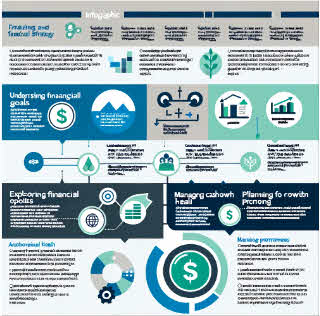How to Secure Funding and Grow Your Business

Understanding the Basics of Business Financing
Every entrepreneur’s journey is unique, but one common stepping stone is learning about the different paths to secure funding. From the shores of small business loans to the vast ocean of capital investment, making choices that resonate with your financial vision can significantly impact your voyage. By demystifying the basics of business financing, you’re not just managing cash flow or using credit to your advantage—you’re unlocking the treasure chest of capital needed to fuel your business’s journey forward.
Entrepreneurs must familiarize themselves with the different funding avenues available, such as small business loans and capital investments, to make informed decisions that align with their financial goals. By understanding the basics of business financing, they can effectively manage cash flow, leverage credit wisely, and secure the necessary capital to fuel their business growth.
The Top 5 Types of Business Financing for Every Entrepreneur
5 Key Business Financing Options Every Entrepreneur Should Know
Navigating the world of business financing can be a thrilling journey for entrepreneurs. With a sea of options from traditional business loan types to innovative startup funding avenues, understanding the landscape is crucial. Whether you’re charting the course for a startup or steering a small business, knowing your financing options can make all the difference. Here’s a lighthouse guiding you through the top 5 financing options, shedding light on everything from conventional small business financing to the more adventurous alternative funding sources.
- Traditional Business Loans: The classic route, offering a structured pathway for financial support with clear terms.
- Term Loans from Banks: A traditional form of financing, term loans provide a lump sum of cash upfront, repaid over a fixed period with interest. These loans are ideal for businesses looking to fund large one-time expenses such as purchasing equipment or expanding operations.
- SBA Loans: Backed by the Small Business Administration, SBA loans offer favorable terms, including lower down payments, longer repayment terms, and capped interest rates. They are designed to support small businesses that may not qualify for traditional bank loans.
- Business Lines of Credit: Unlike a lump sum loan, a line of credit offers businesses flexible access to funds up to a certain limit, which can be drawn upon as needed. Interest is typically only paid on the amount used, making it a versatile option for managing cash flow or unexpected expenses.
- Startup Funding Options: Tailor-made for new ventures, these options provide the seed to grow your entrepreneurial dreams.
- Angel Investment: Angel investors are wealthy individuals who provide capital to startups in exchange for equity or a share in the company. They often bring valuable mentorship, industry connections, and business expertise along with their financial investment, making them an ideal source of funding for startups looking to scale.
- Venture Capital: Venture capital firms invest in early-stage companies with high growth potential in exchange for equity. These firms not only offer substantial financial backing but also provide strategic advice, industry connections, and access to a broader network of potential partners and customers.
- Crowdfunding: This approach allows startups to raise small amounts of money from a large number of people, typically via online platforms. Crowdfunding can be a great way to gauge consumer interest, market a new product, and raise capital without giving up equity, depending on the platform and campaign structure.
- Small Business Financing Avenues: Designed with smaller ventures in mind, they offer a blend of flexibility and accessibility.
- Microloans: Specifically designed for small businesses and startups, microloans offer smaller loan amounts than traditional bank loans. These loans are often provided by nonprofit organizations and are ideal for businesses needing a modest infusion of capital for equipment, inventory, or start-up costs.
- Credit Unions and Community Banks: Local credit unions and community banks can be more flexible and sympathetic to the needs of small businesses compared to larger banks. They may offer more favorable terms, lower interest rates, and a personalized banking relationship.
- Merchant Cash Advances: This financing option provides businesses with a lump sum of cash in exchange for a portion of future sales. It’s particularly suitable for businesses with high credit card sales, offering quick access to capital without the need for traditional collateral.
- Alternative Funding Sources: For those looking beyond the traditional, these sources offer creative and flexible financial solutions.
- Peer-to-Peer (P2P) Lending: P2P lending platforms connect businesses directly with individual investors, bypassing traditional financial institutions. This method can offer more competitive interest rates and a streamlined application process, making it a flexible option for businesses seeking alternative funding.
- Revenue-Based Financing: In this model, investors provide capital in exchange for a percentage of the business’s ongoing gross revenues. This arrangement is particularly attractive for businesses with strong sales but perhaps not enough collateral for traditional loans, as it aligns the repayment with the company’s financial performance.
- Equity Crowdfunding: Unlike traditional crowdfunding, which may offer product pre-sales or donations, equity crowdfunding allows businesses to raise capital by selling small amounts of equity to a large number of investors through online platforms. This option opens up investment to a broader audience, allowing startups and small businesses to access capital while building a community of supporters.
- Equity Financing: Trading a piece of your business for capital, a great way to fund your growth without taking on debt.
- Private Equity Firms: Private equity is capital investment made into companies that are not publicly traded. Most private equity firms buy mature companies, often taking them private, restructuring them, and selling them at a profit. However, some private equity funds also invest in growth-stage companies, offering capital in exchange for equity. These firms bring in a wealth of management and strategic planning expertise, aiming to increase the value of their investments through active participation in management.
- Corporate Venture Capital: Corporate venture capital (CVC) is a subset of venture capital where a large firm invests directly in a small but innovative or high-growth startup. This type of equity financing is not just about financial gain for the corporation but also access to new technologies, products, and strategies. Unlike traditional venture capitalists, corporate investors aim to align their investments with their strategic goals, potentially providing not only capital but also industry expertise, resources, and access to new markets for the startup.
- Initial Public Offerings (IPOs): An IPO is a process of offering shares of a private corporation to the public in a new stock issuance. This allows a company to raise capital from public investors. The transition from a private to a public company can be an important time for private investors to fully realize gains from their investment as it typically includes share premiums for current private investors. Meanwhile, it also allows public investors a chance to participate in the offering.
Exploring these five avenues offers entrepreneurs a comprehensive view of the financial support available to them. By understanding the nuances of each option, you can make empowered decisions to fuel your business’s journey towards success in a competitive landscape.

Crafting a Winning Business Financing Strategy: Tips for Success
For any business eyeing the prize of long-term success, laying down a robust financing strategy is non-negotiable. It’s the backbone of financial health, blending the art of financial planning, the strategic securing of business loans, and the meticulous management of business finances.
Embarking on this journey requires a handful of golden funding strategy tips. Kickstart with proactive financial planning for your business. Dive deep into forecasting, predicting your revenue and expenses with precision. This foresight is your first step towards stability.
Next, navigate the vast seas of securing business loans. It’s not just about finding any port in a storm but seeking harbors that align with your business’s vision and needs. Each loan is a stepping stone towards your goals, choose wisely.
The cornerstone of your voyage, however, is mastering business finance management. Keeping a vigilant eye on your cash flow, scrutinizing expenses, and making strategic decisions is what will steer your business towards sustainable growth and success.
By customizing these strategies to fit your business’s unique blueprint, you’re not just preparing for success; you’re ensuring it. A well-crafted financing strategy is more than a plan—it’s your business’s North Star, guiding you through the tumultuous waters of entrepreneurship towards your destination of success.
The Dos and Don’ts of Applying for Business Financing
By avoiding common mistakes in business loan applications and preparing a strong financial case, you can present yourself as a reliable investment opportunity to lenders.
Dos:
- Conduct Thorough Research: Dive into the plethora of financing options available. Select the one that seamlessly aligns with your business objectives and needs.
- Craft a Detailed Financial Statement: A clear, comprehensive financial statement is your business’s resume. It should accurately showcase your financial health and prospects.
- Organize and Promptly Submit Documentation: Ensure all required documents are not just submitted on time but are also well-organized and straightforward, making it easier for lenders to assess.
Don’ts:
- Avoid Overreaching in Your Financing Request: Requesting more funds than necessary can signal caution to lenders. Aim for a realistic figure that aligns with your actual needs.
- Steer Clear of Inaccuracies: Incomplete or incorrect information can derail your application process, leading to potential delays or outright denial. Double-check all submissions for accuracy.
- Never Underestimate the Power of a Good Credit Score: Your credit score is a beacon of your financial reliability. Maintaining a strong score is crucial for gaining approval.
By adhering to these guidelines, you’re not just applying for business financing—you’re showcasing your business as a promising, well-prepared investment opportunity. This strategic approach can significantly increase your chances of securing the financing your business needs to thrive and grow.
Exploring Innovative Ways to Finance Your Business Growth
Fueling your business’s growth often requires stepping outside the conventional financing box and exploring more creative avenues. Beyond the traditional paths, there lies a world of innovative financing solutions that can inject your venture with the necessary capital to soar.
Consider the dynamic potential of crowdfunding platforms, angel investors for startups, and venture capital funding opportunities. Each of these options opens up new horizons for funding, tailored to different stages and needs of a business.
Crowdfunding Platforms: Harness the power of the crowd by engaging a broad audience of potential investors online. This approach not only raises funds but also builds a community of supporters invested in your success.
Angel Investors for Startups: Connect with experienced entrepreneurs and industry professionals who offer more than capital. Angel investors bring mentorship, strategic advice, and valuable networks to help navigate the early stages of business growth.
Venture Capital Funding Opportunities: For businesses with a clear trajectory for rapid growth, venture capital can provide significant financial backing. In exchange for equity, venture capitalists offer the substantial investment and strategic guidance needed to scale quickly.
Diving into these alternative financing options can unlock tailored solutions that resonate with your business’s growth ambitions. By strategically choosing the right path, you’re not just funding your business; you’re setting the stage for a future of expansion and success.

Comprehensive Checklist
To navigate this path with clarity and purpose, here’s a helpful checklist designed to guide entrepreneurs through the steps of securing the right financing for their business.
Understand Your Financing Needs
- Define your business goals and how financing will help you achieve them.
- Calculate the amount of funding needed to reach your objectives.
- Determine the type of financing that best suits your business model and growth stage.
Explore Financing Options
- Research traditional loans from banks and credit unions for basic understanding.
- Consider government grants and loans designed for small businesses and startups.
- Look into alternative financing options like crowdfunding, angel investors, and venture capital.
- Evaluate the pros and cons of each financing option in relation to your business.
Prepare Your Business and Financial Documents
- Update your business plan to reflect current operations and future projections.
- Prepare detailed financial statements, including profit and loss, balance sheets, and cash flow statements.
- Organize legal documents, such as incorporation papers, licenses, and permits.
Build a Strong Application
- Tailor your application or pitch to each financing source’s preferences and criteria.
- Highlight your business’s strengths, market potential, and competitive edge.
- Ensure all information provided is accurate, thorough, and professionally presented.
Maintain Good Financial Health
- Regularly monitor and improve your credit score.
- Keep your financial records up to date and accurately reflect your business’s performance.
- Manage existing debts wisely to maintain a healthy debt-to-income ratio.
Seek Professional Advice
- Consult with a financial advisor to evaluate your financing strategy and options.
- Get legal advice to understand the implications of different financing agreements.
- Network with other entrepreneurs and industry experts to gain insights and advice.
Apply and Negotiate
- Submit applications to chosen financing sources, following their guidelines closely.
- Be prepared to negotiate terms, especially for options like venture capital or angel investing.
- Review all agreements carefully before signing, paying special attention to terms and conditions.
Plan for Repayment and Future Financing
- Develop a clear plan for how you will use the funds to grow your business.
- Create a repayment plan that aligns with your business’s financial projections.
- Consider how this round of financing fits into your long-term financial strategy.
This checklist is a starting point for entrepreneurs to methodically approach business financing. By ticking off each item, you’re not just preparing for financing—you’re laying the groundwork for sustainable growth and long-term success.
Wrapping Up: The Power of Selecting Optimal Financing Solutions for Enduring Growth
To wrap things up, the journey towards enduring growth and success hinges on selecting the most suitable financing options for your business. It’s about more than just securing funds; it’s about strategically aligning those funds with your business’s vision and needs. By thoroughly evaluating your requirements and considering a spectrum of financing routes, from loans to grants and investors, you position your business to excel in an ever-evolving market landscape.
Strategic financial planning emerges as a beacon, guiding you through potential hurdles and towards exciting prospects. Embrace the value of expert advice and utilize advanced financial tools to craft decisions that propel your business into a future marked by sustainable growth and achievement.
Related:
I Want To Start A Business But Have No Ideas